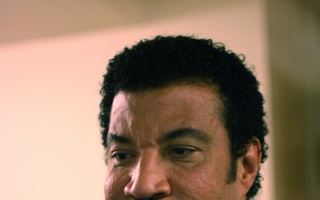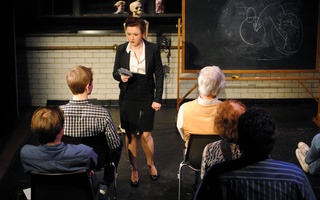“Can you lift that chair like you’re gonna throw it at him?”
It’s 9:00 p.m. on a Friday; in the west lobby of the American Repertory Theater’s Loeb Drama Center, temporarily transformed into a makeshift stage, the cast of “Little Murders” is heading into the night’s third hour of rehearsal. Director Shira Milikowsky, artistic associate at the ART, is instructing actors Juliana N. Sass ’17 and Matthew J. Bialo ’15. The three have spent the last two hours enacting and reenacting a single scene—each word painstakingly analyzed, each gesture calculated for greatest effect, each line tried dozens of different ways.
{shortcode-f43dd93efbadd17d9a0ea9a0643211ff2532a8f9}
“Okay, let’s start again. Let yourself go—see what comes.”
“Little Murders” is the outcome of this year’s Visiting Director’s Project, a collaboration between the Harvard-Radcliffe Dramatic Club and the ART. Since 2003, the VDP has brought accomplished directors from the ART and beyond to work alongside Harvard students; past productions run the gamut from “Romeo and Juliet” to “Accidental Death of an Anarchist.” Participating in the VDP show offers Harvard undergraduates exposure, experience, and the chance to perform on the Loeb Mainstage, but most crucially, the opportunity to learn from a seasoned professional.
Each of the student actors, directors, and producers interviewed for this article cited this opportunity as one of the most rewarding aspects of being involved in the show. Due to its lack of a dramatic arts concentration, Harvard can be a difficult place for aspiring actors, producers, directors, and theater technicians who face the dual challenge of succeeding academically in one field while seeking to become proficient in another. The Visiting Director’s Project is one attempt to counter this issue. Expectations for the production are high and the time commitment formidable, but for the students involved in this year’s VDP it is well worth it—the closest thing to a pre-professional experience they will get at Harvard.
TWISTED, DARK, AND COMEDIC
“Little Murders,” written by cartoonist Jules Feiffer, takes place in a slightly dystopian New York City in a not-quite-dystopian near future. The play tells the story of one family trying to hold it together in the face of anarchy, violence, and crime, with disastrous results. “We’ve been calling it ‘the darkest of dark comedies,’” co-producer Magdalene M. Zier ’16 says.
In many ways, the Newquists are the traditional mid-century sitcom family—mother, father, son, and daughter—but Feiffer’s script and now Milikowsky’s staging work to upend that paradigm. In one twist, Elizabeth Leimkuhler ’15 plays the role of the father, Carol, while Mark J. Mauriello ’15 is cast as Marjorie, the mother. According to Milikowsky, the decision was entirely unexpected. “It wasn’t like I had this thought, ‘Oh, let’s have a man play the mother,’” she says. “What happened was that we did callbacks, and I thought, ‘The person who essentializes Marjorie for me, in my gut, is Mark. And the person who’s kinda feeling like Carol is Liz.’” Milikowsky initially resisted the idea, concerned that it would feel like a gimmick or fail to mesh with the fabric of the play; it took the support of co-producer Garrett C. Allen ’16 and the rest of the production team to solidify the decision. “Garrett looked at me and said, ‘It sounds like you want us to talk you out of this, but that you want to do it, and we just want you to know that we’re up for it. We’re behind you. Let’s do it.’”
Milikowsky’s decision compelled Leimkuhler and Mauriello to push themselves as actors. Both express complex relationships to their characters, born in part of the challenge of depicting a different gender. “I had to learn a new approach to identifying with a character,” Leimkuhler says. “I didn’t want to get up there and be a caricature of a man.”
Mauriello offers similar sentiments. “I know that part of the humor is because of the cross-dressing—‘Hey, there’s a guy in a dress’—but I want the audience to feel like it goes beyond that. Maybe it doesn’t matter if Marjorie is actually male or female; the point is that she’s trying so hard to hold on to that mother role, just to keep her family together.”
KIND OF A FUNNY STORY
When “Little Murders” premiered in 1967 on Broadway it was a flop, putting on only seven performances before closing. When revived off-Broadway in 1969, however, it became a huge success, running for 400 performances over two years. “The play is not of its time; it was actually about five seconds before its time,” says Milikowsky. “The difference between those two productions is that 1968 happened in the middle, and with all the assassinations of that year and the riots and the violence and the escalation of Vietnam, people who came to see that show in ’69 were like, ‘Oh yeah, we totally get this.’”
While things have changed between 1967 and 2014, Milikowsky believes that many of the social issues broached by “Little Murders” persist in various forms to this day. “[The play’s] examination of gender and who has the power, and how status is divided among gender, and how that is being shaken up between genders is still very present in our conversation,” she says.
Zier points out another way in which “Little Murders” is relatable for modern audiences: “A big theme is gun violence. We associate it with this world of anarchy, but it’s clear that it infiltrates our own lives. The play really takes a hard look at that problem. What happens when violence becomes the norm?”
Read more in Arts
No Objections to 'The Judge'Recommended Articles
-
No Murders Occur in Cambridge in 2010The Cambridge Police Department reported that last year saw no murders in the city, just the fourth time in the past 50 years that no murders have occurred in Cambridge.
-
Cambridge Sees First Murder in Over a YearOne man was pronounced dead after a shooting in Cambridge on Saturday, March 12, according to a press release from the Middlesex District Attorney’s Office, representing the first murder in Cambridge in more than a year.
-
Former Police Officer Allegedly Kills Three Family Members, Then Shoots Self
-
 Lionel Richie Recruits New Talent
Lionel Richie Recruits New Talent -
Phenomenal Cast in "Wonderful Town"Perhaps one of the greatest strengths of “Wonderful Town” is the acting, which transcends the music and lines. From Bob Baker’s (Mark R. Heath ’14) love-struck grin to Leimkuhler’s hilarious bouncing subway ride, each actor’s range of emotions, not only in their faces but in their body movements, drives the story home. At the end of the show, the performers’ honest and passionate portrayals of each character remains the best part of a wonderful “Wonderful Town.”
-
 "Miss Margarida" Gets Her Way
"Miss Margarida" Gets Her Way













